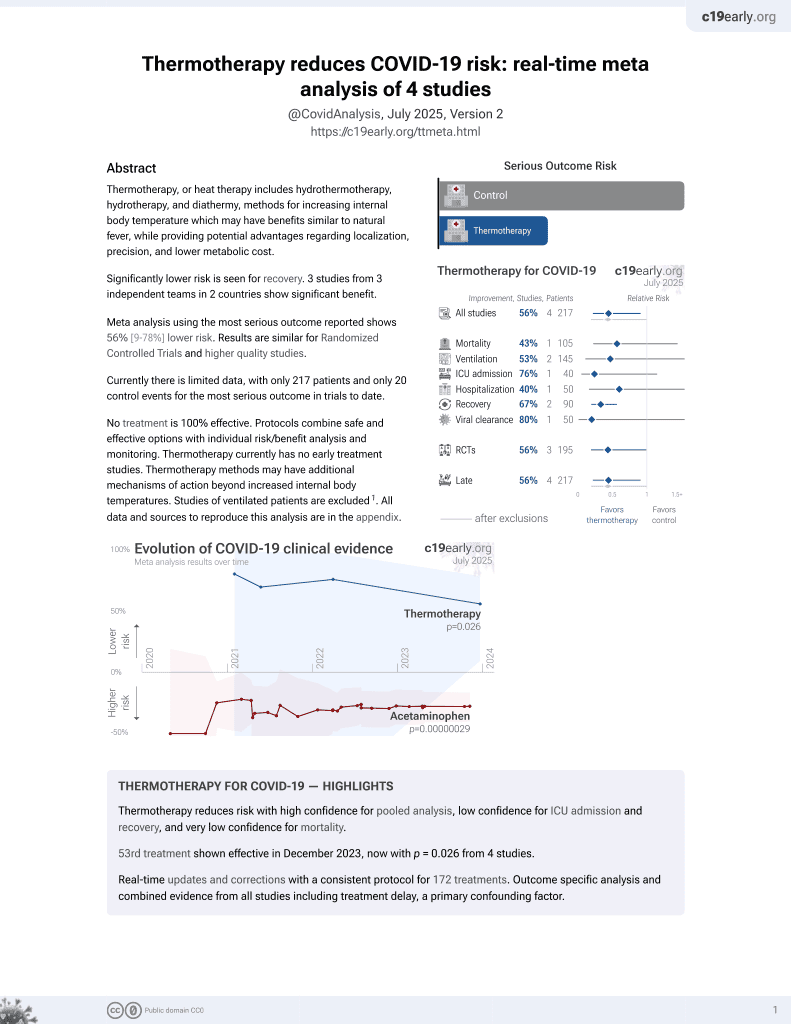
Human monocyte stimulation by experimental whole body hyperthermia
et al., Wiener Klinische Wochenschrift, 114:3, Feb 2002
54th treatment shown to reduce risk in
December 2023, now with p = 0.026 from 4 studies.
Lower risk for recovery.
No treatment is 100% effective. Protocols
combine treatments.
6,400+ studies for
210+ treatments. c19early.org
|
Analysis of the effect of whole body hyperthermia, used to model fever, on human monocyte function. Healthy volunteers were immersed in a 39.5°C hot water bath to elevate their body temperature. Hyperthermia led to increased expression of the monocyte surface proteins CD14 and CD11b, while decreasing expression of CD62L. Similar changes occurred with in vitro heat treatment of whole blood. Three hours after hyperthermia, monocytes showed enhanced responsiveness to bacterial endotoxin/LPS ex vivo, indicated by higher TNF-alpha release. Authors conclude that fever's thermal effects directly activate monocytes, increasing their ability to recognize and respond to pathogens in the bloodstream, representing a systemic immune response.
Zellner et al., 15 Feb 2002, peer-reviewed, 6 authors.
HUMAN MONOCYTE STIMULATION BY EXPERIMENTAL WHOLE BODY HYPERTHERMIA STIMULIERUNG HUMANER MONOZYTEN DURCH EXPERIMENTELLE GANZKÖRPER HYPERTHERMIE
The thermal effect of fever, an evolutionarily conserved acute-phase response, has been associated with improved survival and shortened disease duration in infection. The molecular consequence of this beneficial fever response is poorly understood. To study an influence of hyperthermia on human monocytes, which are important in recognition and elimination of pathogens, twelve healthy volunteers were immersed in a 39.5°C hot water bath to increase their body temperature. The expression of the endotoxin receptor CD14 and the complement receptor CD11b increased after the hot water bath (P<0.05), whereas the expression of the selectin CD62L, which mediate the initial attachment of leukocytes at endothelium during inflammation, was downregulated after hyperthermia (P<0.05). Comparable changes in monocyte receptor expression were observed after an in vitro hyperthermia. Furthermore, 3h after in vivo hyperthermia the response of monocytes to endotoxin was enhanced in an ex vivo lipopolysaccharide-stimulation-assay as shown by increased TNF-α release (P<0.05). We conclude that the thermal effect of fever leads directly to an activation of monocytes which increases their ability to respond to a bacterial challenge.
References
Alheim, Bartfai, The interleukin-1 system: receptors, ligands, and ICE in the brain and their involvement in the fever response, Ann NY Acad Sci
Asano, Mcintyre, Bednarczyk, Wygant, Kleinerman, Liposomal muramyl tripeptide upregulates adhesion molecules on the surface of human monocytes, Oncol. Res
Birkenmaier, Horn, Modulation of the endotoxin receptor (CD14) in septic patients, J. Trauma
Blatteis, Sehic, Cytokines and fever, Ann NY Acad Sci
Brandts, Ndjave, Graninger, Kremsner, Effect of paracetamol on parasite clearance time in Plasmodium falciparum malaria, Lancet
Cannon, Houstek, Nedergaard, Brown adipose tissue. More than an effector of thermogenesis?, Ann NY Acad Sci
Davenpeck, Steeber, Tedder, Bochner, P-and L-selectin mediate distinct but overlapping functions in endotoxin-induced leukocyte-endothelial interactions in the rat mesenteric microcirculation, J Immunol
Gomez-Estrada, Ramos-Damian, Cerda-Ocana, Phagocytotic activity of rabbit pulmonary macrophages at different temperatures, Arch Invest Med
Hojman, Lounsbury, Harris, Horn, Immunodepressive effects of LPS on monocyte CD14 in vivo, J Surg Res
Izbicki, Raedler, Anke, Ziegler-Heitbrock, Beneficial effect of liposome-encapsulated muramyl tripeptide in experimental septicemia in a porcine model, Infect Immun
Jiang, Cross, Singh, Chen, Viscardi et al., Febrile Core temperature is Essential for Optimal Host defense in Bacterial Peritonitis, Infect Immun
Jiang, Detolla, Singh, Gatdula, Fitzgerald et al., Exposure to febrile temperature upregulates expression of pyrogenic cytokines in endotoxin-challenged mice, Am J Physiol
Kappel, Diamant, Hansen, Klokker, Pedersen, Effects of in vitro hyperthermia on the proliferative response of blood mononuclear cell subsets, and detection of interleukins 1 and 6, tumour necrosis factor-alpha and interferon-gamma, Immunology
Kappel, Stadeager, Tvede, Galbo, Klarlund et al., Effects of in vivo hyperthermia on natural killer cell activity, in vitro proliferative responses and blood mononuclear cell subpopulations, Clin Exp Immunol
Kluger, Kozak, Conn, Leon, Sozynski, Role of fever in disease, Ann NY Acad Sci
Ohlsson, Linder, Lundberg, Axelsson, Release of cytokines and proteases from human peripheral blood mononuclear and polymorphonuclear cells following phagocytosis and LPS stimulation, Scan J Clin Lab Invest
Ostberg, Taylor, Baumann, Repasky, Regulatory effects of fever-range whole-body hyperthermia on the LPS-induced acute inflammatory response, J Leukoc Biol
Pajkrt, Manten, Van Der Poll, Tiel-Van Buul, Jansen et al., Modulation of cytokine release and neutrophil function by granulocyte colony-stimulating factor during endotoxemia in humans, Blood
Passlick, Labeta, Izbicki, Ostertag, Löffler et al., Prevention of experimental endotoxin shock by a monocyte activator, Antimicrob Agents Ch
Robins, Kutz, Wiedemann, Katschinski, Devchand et al., Cytokine induction in humans by 41,8°C whole body hyperthermia, Cancer Lett
Stohlawetz, Hahn, Koller, Resch, Smolen et al., Immunophenotypic characteristics of monocytes in elderly subjects, Scand J Immunol
Strutz, Heller, Krasemann, Krone, Muller, Relationship of antibodies to endotoxin core to mortality in medical patients with sepsis syndrom, Intens Care Med
Troelstra, De Graaf-Miltenburg, Van Bommel, Verhoef, Kok et al., Lipopolysaccharide-coated erythrocytes activate human neutrophils via CD14 while subsequent binding is through CD11b/CD18, J Immunol
Wenneras, Huerre, Arondel, Ulevitch, Mathison et al., Blockade of CD14 increases shigella-mediated invasion and tissue destruction, J Immunol
